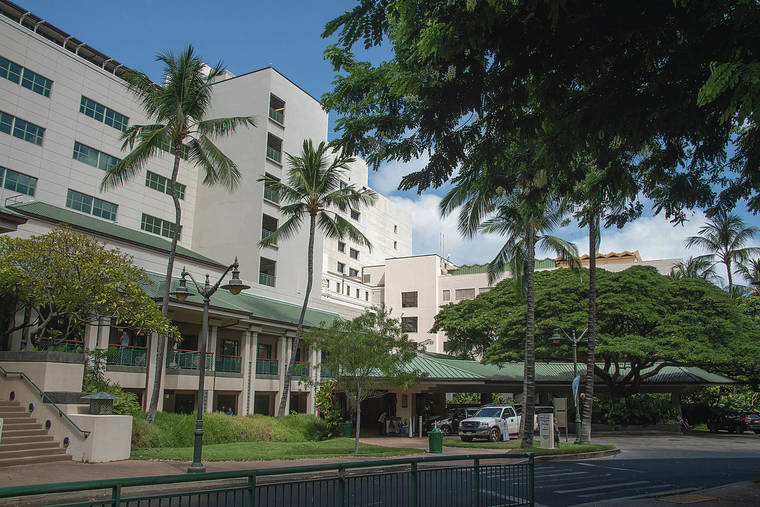Hospitals in Hawaii need help for exhausted nurses and doctors

CRAIG T. KOJIMA / CKOJIMA@STARADVERTISER.COM
Doctors and nurses are preparing for a surge of patients due to the rise in the number of COVID-19 infections. The Queen’s Medical Center, above, offers vaccines at its pharmacies and other locations.
Some Hawaii hospitals are asking for extra support to relieve exhausted nurses and doctors and have begun to postpone elective surgeries, including cardiac or orthopedic procedures, to prepare for more COVID-19 patients due to the recent surge in cases, said Lt. Gov. Josh Green on Monday.
Green urged people to get vaccinated against COVID- 19, warning that the number of patients landing in hospitals will only rise as case counts continue to grow.
“The best way, of course, to deal with this hospital surge is to not have it,” he said. “In other words, to have everyone be vaccinated or wearing masks or not gathering, so there’ll be a lot of discussion to bring the heat down in coming weeks. That’s also going to be complicated by having schools open, but hopefully we’ll be able to do it.”
Green made the comments on the Honolulu Star-Advertiser’s Spotlight Hawaii Opens in a new tab livestream show.
On Monday the state Department of Health reported 365 new confirmed and probable coronavirus infections, bringing the state’s total since the start of the pandemic to 43,227 cases.
While slightly lower than the 400s range over the weekend, the numbers since mid-July have multiplied rapidly Opens in a new tab. The average positivity rate at 6%, Green said, is also worrisome.
Don't miss out on what's happening!
Stay in touch with breaking news, as it happens, conveniently in your email inbox. It's FREE!
Green said the number of COVID-19 patients in Hawaii hospitals rose to 150 and that about 135, or 90% of them, are unvaccinated. On Monday the COVID-19 dashboard listed 145 patients in hospitals, up from 117 on Monday.
“We’re seeing the huge delta surge post-July Fourth now spread through the community, through mostly community spread,” said Green. “We have over 3,000 active cases, and we have 150 of our citizens in the hospitals sick right now. So the case counts go up, and then two weeks later the hospital counts follow. That’s what we’re seeing, exactly, so we have to vaccinate everyone that will be vaccinated or can be vaccinated as a part of our larger plan.”
Although Hawaii hospitals have enough capacity at this time, Green said the rise is concerning, and looking a lot like last summer, when the number of COVID-19 patients in hospitals surged past 300.
Hawaii’s public schools resume in-person classes today, with a multilayered strategy of safety protocols in place.
Reopening schools was a tough call to make, Green said, but education is critically important, and losing a second year of school would be “catastrophic.” Most children who contract COVID-19 have mild symptoms, with about 1% historically ending up in hospitals.
Still, much remains unknown about the coronavirus, said Green, who supports distance learning as an option for those with preexisting conditions.
Most coronavirus infections in Hawaii resulted from community spread, according to Green, mostly among unvaccinated individuals, along with residents traveling to the mainland who end up infecting family members.
It may be time to bring back limits on the size of gatherings to 10 or fewer, he said, and to consider mandatory post-travel testing for Hawaii residents returning to the state.
“Where COVID is concerned, size definitely does matter, so we have to be very careful with the size of our gatherings,” he said. “We have to do that. If we’re not careful, we’re going to just see explosions in these clusters of 25, 30, 50 people, and that’s going to be terrible.”
The Health Department reported Monday that 1,762,608 COVID-19 vaccine doses had been administered, including about 8,000 over the weekend; 60.3% of the state’s population is fully vaccinated, while 67.2% received at least one dose.
In response to news that four of Hawaii’s major hospitals announced COVID-19 vaccine mandates Opens in a new tab for employees, Green said he personally does not support vaccine mandates, but he sees the wisdom in asking all health care workers to get vaccinated or submit to weekly or biweekly COVID-19 tests.
“I do think it’s a moral obligation to get vaccinated if you’re a health care worker,” he said, “because you could spread COVID to your patients and that’s not acceptable.”



